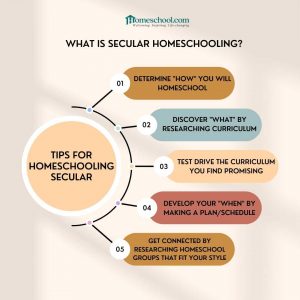One of the first big choices you make as a new homeschooler is to decide how you will homeschool. Secular homeschooling and faith-based homeschooling are the two main groups of thought with which homeschoolers will typically align. These two viewpoints usually stem from your personal or family worldview. It is an easy choice for some families, but in case things aren’t clear let’s dig a little deeper.
What Is Secular Homeschool Education?
Secular education is what you normally would see in a public school. Secular teaching means you teach without adding any faith-based views. When teaching from a secular perspective, you do not leave out religions but present them in a neutral way. In fact, historically, public schools have been the main source of secular education. However, secular homeschooling has been and is still growing! Indeed, diverse types of families are choosing to homeschool over public school. As a result, this increase in the secular homeschooling community makes finding secular curricula, support groups, and materials easier.
Why Choose Secular Homeschooling?
In a recent Homeschool.com survey, parents expressed that their #1 reason to homeschool was to give their children a unique and tailored education. But, families choose to homeschool for many non-religious reasons.
 Helping their child progress at their own pace.
Helping their child progress at their own pace.- Keeping away from the increased school violence.
- Providing different curriculum from public school.
- Avoiding bullying to or by their child.
- Letting their child focus on special interests.
- Traveling with their children.
Of course, some of the families that choose to homeschool secular would still classify themselves as religious people. Most often this type of homeschooler will sprinkle in religion with the core subjects. But keep the courses separate. On the other hand, non-religious homeschoolers often choose to remove all religious teachings and become purely secular homeschoolers.
Religious Families That Homeschool Secular
Can you be religious and a secular homeschooler? Yes, of course! You do not have to be non-religious to provide a secular education. Like the public school setting, you will separate your faith from lessons. Some religious families homeschool without religion to:
- Let their child choose their spiritual path later in life.
- To respect two or more religions currently present in the household.
- To emphasize respect for all faiths by not focusing on one within academics.
- Keep with public school standards.
- To keep church time separate.
What Is a Secular Homeschooling Curriculum?
So you want to be a secular homeschool, now what? What about curriculum? Great questions! As you start your search, you will notice differences in curriculum. You want to find the best curriculum to fit your homeschooler and family, so you need to know what to notice in your search. Let’s learn more about what makes a curriculum religious or secular below.
- A religious curriculum will teach subjects with that religion in mind. They may also include items such as religious quotes and passages from their faith-based texts.
- A secular curriculum will not have any religious teachings or themes. Regular subjects will not have references to any religions or beliefs. Religions will be mentioned to teach the history and cultures of the various world religions.
Secular Science Curriculum
While looking for a science curriculum, you want to be aware of the differences. Most options include basic science topics like weather, light, and habitats. However, a secular curriculum will include specific topics. Items such as the Big Bang Theory, reproduction, and evolution. These topics are typically left out or covered through a spiritual lens in a faith-based curriculum.
Secular History Curriculum
The history curriculum is where you can find other variations. Religion has molded both world history and American history. It will be hard to teach history without talking about religion. A secular homeschool history curriculum will teach history with a neutral view of the facts without pushing any religion as correct. Faith-based history may cover the facts but include their religion’s beliefs.
Suggested Products
Additional Non-Religious Curriculum Considerations
Math, language arts, and other subjects are the same though, right? Well maybe. Differences may appear in how they are presented. Faith-based versions of other subjects may include religious wording, bible quotes, and references to religious material. If you are wanting a purely secular curriculum, be sure to read through each curriculum description, read homeschool reviews, and check the “about us” section of the curriculum website to determine if it is indeed a secular homeschool curriculum before you purchase.
Secular Homeschooling Connections
As you start your homeschooling journey, you will want to make connections. Many homeschoolers join local or online homeschool support groups for the following reasons:
- Help understand and meet state laws.
- Get support from current homeschoolers.
- Find socialization opportunities for their children.
- Get recommendations and reviews.
- Share homeschool instruction and materials.
- To find a sense of community.
Homeschool support groups are often either secular or faith-based, but in our changing homeschool culture there are more neutral inclusive groups developing. This is great news for the secular community. However, some support groups will request a statement of faith before allowing members to join, while other groups might initially look secular but allow faith-based materials to be included. While each family is unique and has their own preference, it’s important to read any group membership rules thoroughly before joining to be sure the group is what you are looking for.




